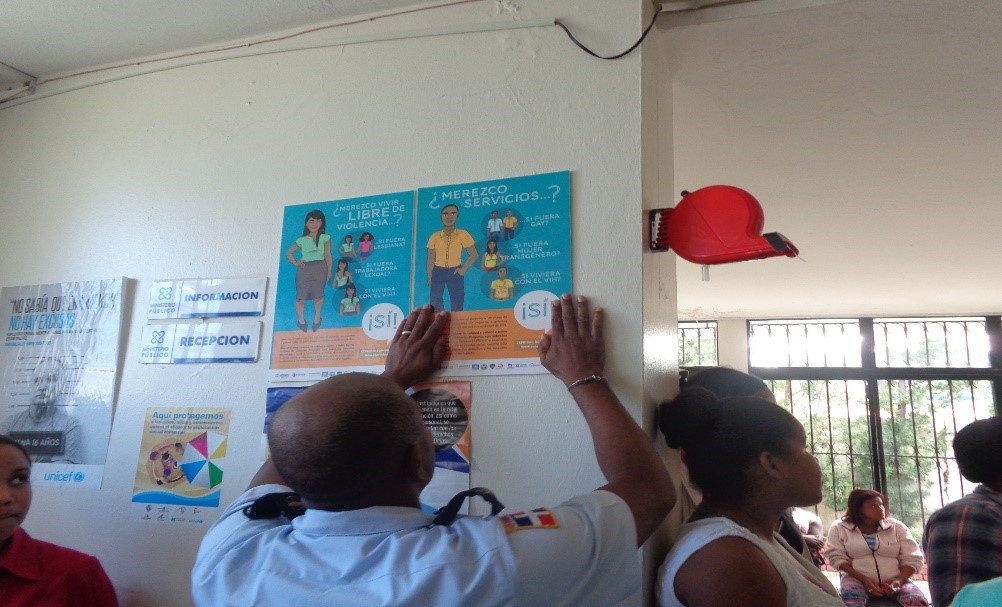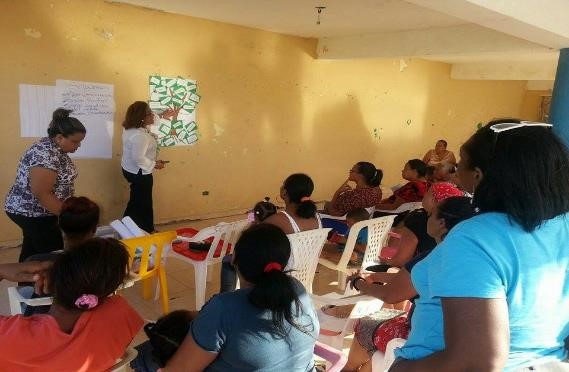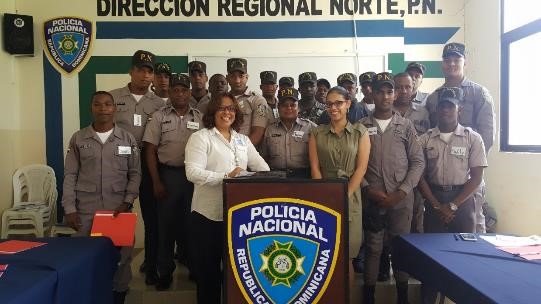Written by Robyn Dayton, Technical Advisor, LINKAGES, and Aubrey Weber, Technical Officer, Research Utilization, FHI 360

Informational GBV materials are placed in the District Attorney’s office in Puerto Plata.
LINKAGES is partnering with the Center for the Promotion of Human Solidarity (CEPROSH), a local community-based organization (CBO), in the Dominican Republic to increase access to holistic post-gender-based violence (GBV) care, including HIV services, for members of key populations (KPs) – men who have sex with men (MSM), sex workers (SWs), and transgender women. Programs designed to decrease HIV incidence and improve the outcomes of people living with HIV (PLHIV), particularly those for KPs, must address GBV to be effective. For example, a recent study demonstrated that transgender sex workers in Santo Domingo are less likely to use condoms if they have experienced violence, thereby increasing their HIV risk. Studies from the Dominican Republic also demonstrate that violence from a sexual partner is associated with poor HIV treatment outcomes among female SWs. Evidence of the link between HIV prevalence rates and experiences of violence can also be seen among the general population – adult women in the Dominican Republic who have experienced violence are three times as likely to be living with HIV, and women in the Dominican Republic who are living with HIV are more likely to experience violence from their partners.
Given the low uptake of post-GBV care in the Dominican Republic, especially among members of KPs, and the missed opportunities to link victims of violence to services – particularly HIV services – the USAID– and PEPFAR– supported LINKAGES project, in partnership with CEPROSH, undertook an intervention in Puerto Plata, Dominican Republic to increase (1) availability of KP-friendly post-GBV services, (2) service integration for all victims of violence, and (3) post-GBV service-seeking among members of KPs. As part of the intervention, CEPROSH led the formation of a technical working group (TWG) of institutions that offer services to victims of violence, including the police, the public hospital, all local clinics for PLHIV, the district attorney’s office, and the Ministry of Women. The members of the TWG committed their institutions to providing KP-friendly services and CEPROSH trained staff from each institution. CEPROSH also led the development of materials that help identify violence, describe KP members’ rights, and list available services. These materials and outreach events were used to indicate which institutions are KP-friendly and raise awareness about and identify victims of violence. The goal of the intervention was to increase post-GBV service uptake, improving outcomes for victims of violence, including those related to HIV.

Community leaders share the violence prevention and response services available to KPs.
To determine the impact of efforts to date, LINKAGES interviewed service providers and clients who received post-GBV care in Puerto Plata and reviewed CEPROSH programmatic data from November 2016 to August 2017. The assessment showed that the intervention achieved its desired short-term and intermediate results, demonstrating that a civil-society-led initiative can strengthen both public and private post-GBV services, make those services more inclusive, and increase their uptake by KP individuals. Pre- and post-test results from trainings demonstrate that after the trainings, attendees across sectors felt less stigma toward KPs and were less likely to blame victims for violence against them. At the same time, the intervention strengthened the overall system for violence response in Puerto Plata, with providers and clients reporting that providers across institutions now offer improved services to all victims of violence and that more members of the general population are also seeking post-GBV support. As noted by a respondent at the Ministry of Women, “Thanks to the information given by CEPROSH, the directory, and the brochure, more women are coming to get services here. Before, we might get seven girls a month. Now, we are getting six or seven daily. They have empowered themselves to come here and find assistance.”
Looking specifically at HIV services, the intervention increased access to post-exposure prophylaxis (PEP) and HIV testing, identified new HIV-positive individuals, improved antiretroviral adherence, and provided new opportunities for continuous engagement of both HIV-positive and -negative KP members. Through violence detection efforts and spontaneous disclosure, 435 people reported experiencing violence from November 2016 to August 2017. Twelve of these reports were of sexual violence in the past 72 hours, with 66 percent (8) receiving PEP. Of the 435 individuals reporting violence, 244 were members of KPs with an unknown HIV status. Forty-five percent (109) completed an HIV test as part of post-GBV care, with four new cases of HIV detected. While viral load was not specifically monitored in the assessment, doctors from HIV clinics noted that they have seen a change. One physician from the HIV clinic at the public hospital said, “Helping the clients to solve their violence situations is a direct help to their viral load, because if they are scared or suffering violence probably they won’t take their medications and their viral load will go up. We have seen in several cases, that after receiving violence response services, their adherence to the treatment has improved and therefore their viral load has declined. Their health and attitude significantly improves.” Support groups have proven an effective way to continually engage with victims who are members of KPs. Fifty people attend the bimonthly support group meetings held at CEPROSH’s HIV clinic.
Finally, although participation in the intervention meant increased responsibilities for already overtaxed staff, service providers were enthusiastic about their new ability to address client needs and committed to offering new services. One CEPROSH staff person noted, “I have changed my way of speaking to clients and how I handle them. Before I just mentioned the issue of violence, now I’m able to help them address the issue. The attitude of the staff has changed significantly… When the activity began, some had a small notion of the GBV subject, but they said that there wasn’t any time to deal with that; now everyone feels committed.” Police respondents also indicated that trained officers took new pride in their work, “I’ve always been proud of being a police officer, but some of my partners who weren’t that proud, now they are.”

Puerto Plata police officers attend a violence prevention and response training.
Most importantly, KP clients described a new willingness to attend services and corresponding improvements in their lives due to those services. As one sex worker who disclosed intimate partner violence said, “I understand a lot of things better. Before I was really closed inside myself. I believe that that man was everything for me; I was used to a man who was bad. I was attached to that relationship but after the appointments with the psychologist I became stronger and understood that I deserved better. I left that relationship and feel better about myself. They lifted my self-esteem.”
These positive findings, as well as the identification of opportunities for improvement – such as the need for more messaging on the importance of reporting violence quickly to have access to PEP and other time-sensitive services – are helping to inform the expansion of the intervention beyond Puerto Plata.
The findings also demonstrate that integrated HIV and GBV programming benefits members of the general population as well as KPs. New strategies and laws are being contemplated and implemented to address the incredible burden of violence against women in countries like the Dominican Republic. Collaboration with implementers who focus on issues that intersect with violence against women, such as GBV against KPs and efforts to address the HIV epidemic, can be an important part of an effective response.
